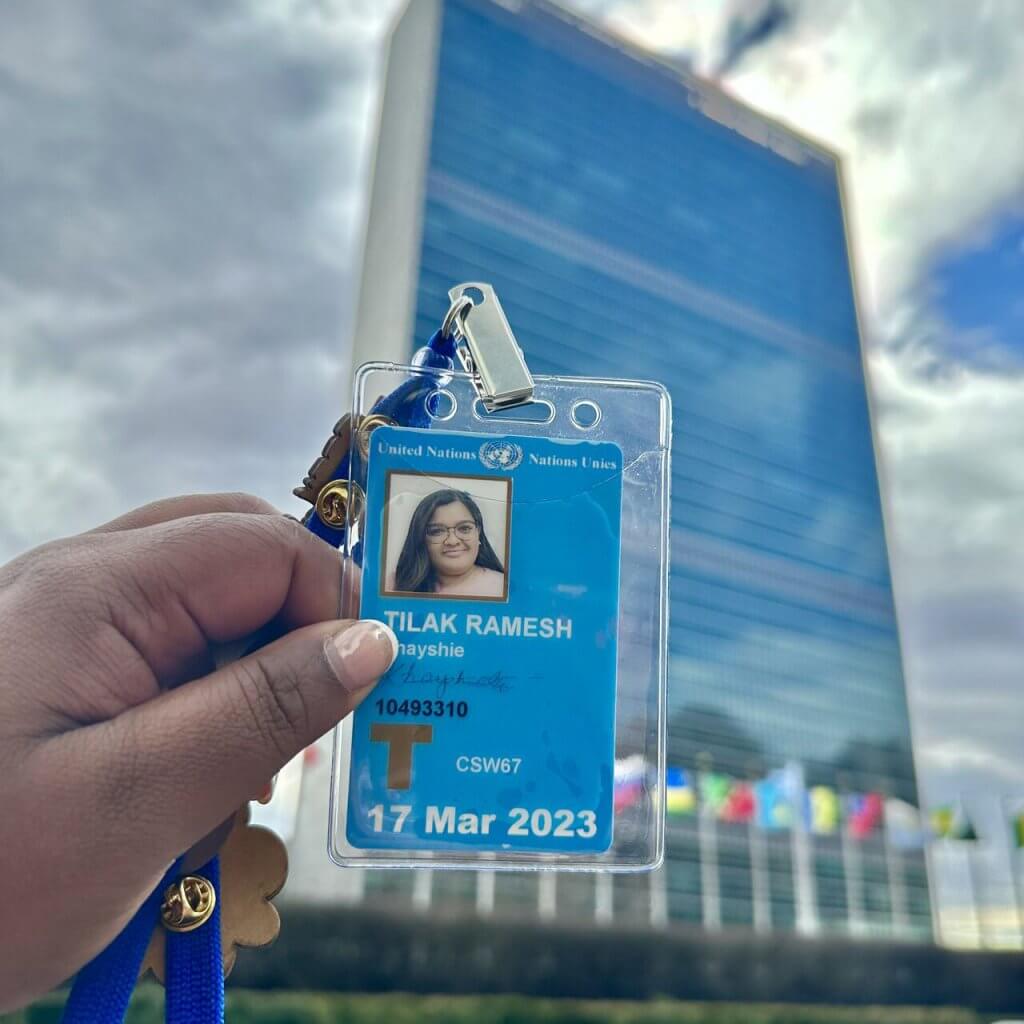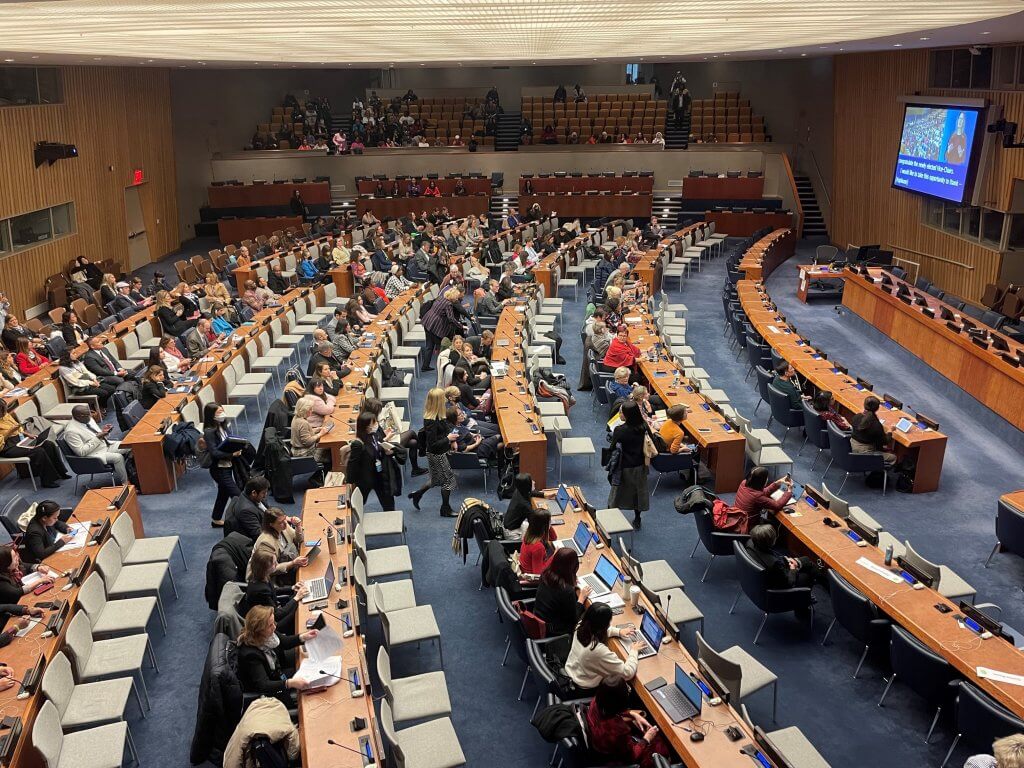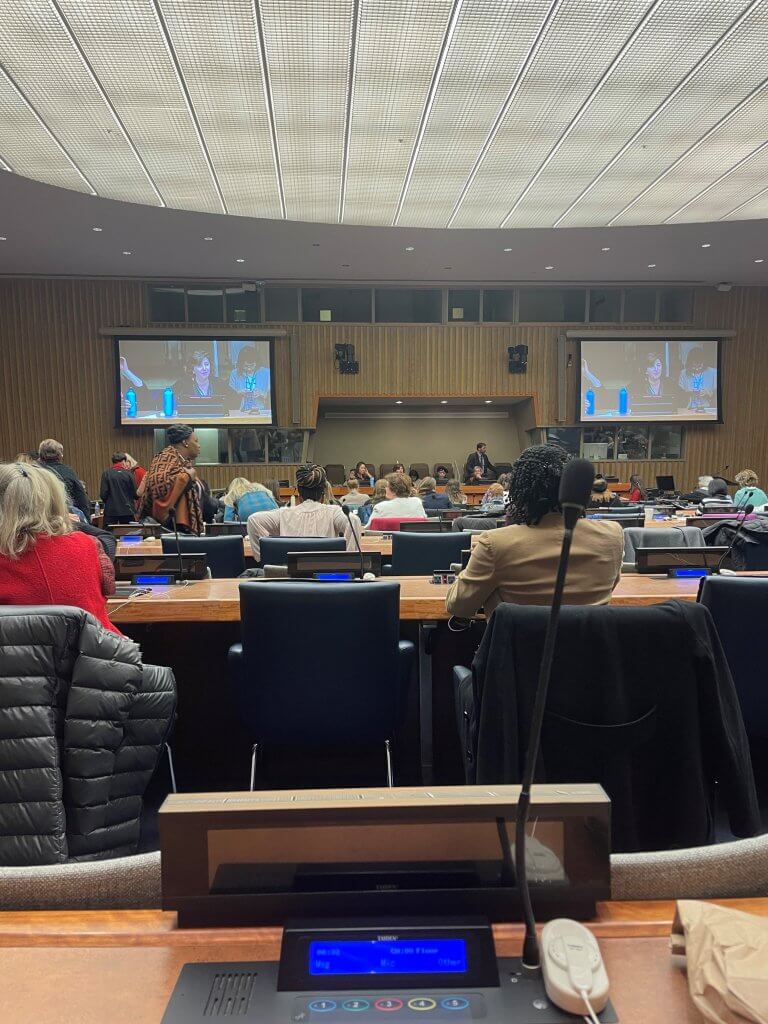By Khayshie Tilak Ramesh

Advocacy has been a huge part of my life for a long time, both personally and professionally. Advocating for the progression of rights and pushing for better outcomes has been a driving factor in my life as a lawyer, community advocate and as a diversity, equity and inclusion strategist.
Naturally, when the opportunity presented itself to attend Commission on the Status of Women (CSW), I grabbed it with both hands. My mind reeled with social policy ideas, and I began dreaming about the level of change and transformation which could be achieved at a global scale with so many brilliant minds in one room.
So, what is CSW?
CSW is the largest global forum on women’s rights. It’s held every year at the United Nations Headquarters in New York with representatives from all over the world in attendance, including ministers, government leaders, NGOs and other advocates.
The aim of the game is to walk out with ‘agreed conclusions.’ The agreed conclusions document fleshes out the theme of each year, how it impacts gender equality and what all member states are committing to in order to progress gender equality worldwide. The agreed conclusions are created through weeks of negotiations that span beyond the walls of CSW itself.
In essence, it’s a global group assignment (*shudders*). Think hundreds of negotiators in a room, representing countries from all over the world, with vastly different views, with a giant Google doc on a screen going through the agreed conclusions paragraph by paragraph. To make matters more complicated, it’s a consensus document. This means that all countries must agree on each paragraph – no majority rules here.

With that context in mind, you can begin to imagine the diluted nature of the agreed conclusions as specific and actionable language is continually swapped out for vague and interpretable replacements until all member states can agree to move forward. For example, ‘create a policy on’ maybe be swapped for ‘take measures to’ so that more progressive countries can still create a policy, while others can choose an alternate action that aligns with their appetite. It’s also important to remember the wider geopolitical context which influences what happens in the room.
Women’s rights advocates have specific language which we strongly push for each year to progress intersectional gender equality, including ‘comprehensive sexual education’, ‘sexual health and reproductive rights,’ and ‘women and girls in all of their diversity’. We also strongly argue against specific language, such as ‘The Family’ which has a specific meaning of exclusively referring to the nuclear family of heterosexual parents with biological children – not inclusive of LGBTQIA+ families or kinship relationships within First Nations communities.
This negotiation process over language in the agreed conclusions goes back and forth, often resulting in inclusive and progressive language being axed early to make the agreed conclusions more palatable and thus, more likely to reach a consensus with more conservative countries – this is far from the aspirational forum I was hoping for.
This negotiation process over language in the agreed conclusions goes back and forth, often resulting in inclusive and progressive language being axed early to make the agreed conclusions more palatable and thus, more likely to reach a consensus with more conservative countries – this is far from the aspirational forum I was hoping for.
After 4 days of seemingly endless negotiations, I found myself sitting on the couches outside the conference room on the final day with my head in my hands. At this stage it was 3am and negotiations had been ongoing since 11am that morning, not to mention that negotiations went on until 4am the previous day. “When pretty much all of the progressive and inclusive language is stripped from the agreed conclusions, what’s the point of being here?” I asked myself with a sense of cynicism. Thankfully Helen Dalley-Fisher, longtime CSW veteran and Equality Rights Alliance superstar, chimed in with an apt metaphor: “CSW is about creating the floor, not raising the ceiling.”
Half awake, with the lingering scent of the pepperoni pizza that I had smuggled through the UN security scanners for dinner that night still on my clothes, I looked up at Helen as she began to elaborate.

“When you imagine CSW as a Venn diagram of countries, that little pinpoint in the middle where they all overlap is the agreed conclusions. It’s the lowest common denominator of what all of these countries can agree on – so, naturally it’s not going to be compelling, but it’s the ground floor and that’s important to maintain.”
She went on to explain that our role as advocates is often to hold down the gender equality fort and make sure that we don’t lose ground from the progress made in years past.
As we watch progressive language being deleted from the document, we are faced with a choice. We can dwell in our grief and lose hope, or we can get strategic and use this loss as a bargaining chip to preserve progressive language elsewhere in the agreed conclusions by referencing that we conceded on this instance. While we’re unlikely to get all mentions of progressive language in, if we even get one more mention or the same amount as last year, this is progress.
The agreed conclusions are a product of compromise and sacrifice. What we’re doing here is setting the floor and that’s just as important as raising the ceiling – it sets the minimum standard for gender equality globally.
The agreed conclusions are a product of compromise and sacrifice. What we’re doing here is setting the floor and that’s just as important as raising the ceiling – it sets the minimum standard for gender equality globally.
This insight was a real gamechanger for me in how I viewed social policy and international advocacy. I spend a lot of my time progressing gender equality through pushing the limits and thinking about new heights we can reach. But it’s just as important to take time to look at the floor beneath us and consider how we can preserve it to ensure we don’t regress – and that we have a consistent floor, globally.
CSW was not the progressive and aspirational opportunity that I initially thought it would be. We didn’t get to raise the ceiling like I so desperately wanted to do. However, it did teach me that the protection of rights is just as important as the progression of rights.
While we may not always take long strides forward, sometimes it’s enough to hold your ground.




